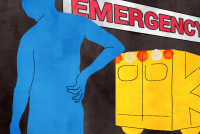Latest KFF Health News Stories
Contraception Is Free to Women, Except When It’s Not
The landmark federal health law required most commercial health plans to cover a comprehensive list of birth control methods approved by the Food and Drug Administration free of charge to female patients. But health plans don’t have to cover every option, and newer methods are not included in the federal list of covered services.
Readers and Tweeters Connect the Dots on Topics From Vaccine Development to Long Covid
Kaiser Health News gives readers a chance to comment on a recent batch of stories.
Facing Headwinds on New Alzheimer’s Drug, Biogen Launches Controversial Campaign
The makers of Aduhelm, a drug approved last month despite concerns raised by experts about its effectiveness, have launched a website and ads designed to urge people who are worried about their memory to ask doctors about testing. But some health advocates say it is misleading because some memory loss with aging is normal.
After 18 Months, Sutter Antitrust Settlement Finally Poised for Formal Approval
A year and a half after Sutter Health agreed to a tentative settlement in a closely watched antitrust case, the San Francisco judge presiding over the case indicated she would sign off on the terms, pending agreement on another contentious issue: attorney fees.
KHN’s ‘What the Health?’: Delta Changes the Covid Conversation
With covid cases on the upswing again around the country, partisan division remains over how to address the pandemic. Meanwhile, the Biden administration proposes bigger penalties for hospitals that fail to make their prices public as required. Stephanie Armour of The Wall Street Journal, Alice Miranda Ollstein of Politico and Tami Luhby of CNN join KHN’s Julie Rovner to discuss these issues and more. Also, for “extra credit,” the panelists suggest their favorite stories of the week they think you should read, too.
Sen. Wyden: $3.5T Budget May Have to Trim but It Can Set a Path to ‘Ambitious Goals’
Sen. Ron Wyden (D-Ore.), who is helping to negotiate the health care spending framework for the Democrats’ budget plan, said lawmakers may have to settle for very basic versions of programs deployed in the package. But the key, he added, is to get the “architecture of these changes, bold changes,” started and show people what is possible.
Hospital ‘Trauma Centers’ Charge Enormous Fees to Treat Minor Injuries and Send People Home
Only severely injured patients are supposed to be billed for “trauma team alert” fees that can exceed $50,000.
KHN’s ‘What the Health?’: Here Comes Reconciliation
Democrats in Congress reached a tentative agreement to press ahead on a partisan bill that would dramatically expand health benefits for people on Medicare, those who buy their own insurance and individuals who have been shut out of coverage in states that didn’t expand Medicaid. Meanwhile, controversy continues to rage over whether vaccinated Americans will need a booster to protect against covid-19 variants, and who will pay for a new drug to treat Alzheimer’s disease. Rachel Cohrs of Stat and Sarah Karlin-Smith of the Pink Sheet join KHN’s Julie Rovner to discuss these issues and more. Also, Rovner interviews KHN’s Rae Ellen Bichell, who reported and wrote the latest KHN-NPR “Bill of the Month” episode about a mother and daughter who fought an enormous emergency room bill.
How ERs Fail Patients With Addiction: One Patient’s Tragic Death
Two intractable failings of the U.S. health care system — addiction treatment and medical costs — come to a head in the ER, where patients desperate for addiction treatment arrive, only to find the facility may not be equipped to deal with substance use or, if they are, treatment is prohibitively expensive.
KHN’s ‘What the Health?’: Becerra Urges Congress to Expand Medicare, Address Rx Prices
Health and Human Services Secretary Xavier Becerra is the special guest for this bonus episode of KHN’s “What the Health?” podcast. He and host Julie Rovner discuss a breadth of topics the secretary oversees, including covid-19, prescription drug prices, Medicare, Medicaid and the Affordable Care Act.
As Congress Wrestles With Plans to Expand Medicare, Becerra Says Any One Will Do
In an interview for KHN’s “What the Health?” podcast, HHS Secretary Xavier Becerra says the administration is eager for Congress to make changes to Medicare that will provide more benefits and make more older adults eligible for the program. He also said a priority will be making permanent the enhanced premium subsidies for Affordable Care Act marketplace plans.
Why We May Never Know Whether the $56,000-a-Year Alzheimer’s Drug Actually Works
It could take years for follow-up studies to prove Aduhelm slows the disease — or doesn’t. Meanwhile, its maker will profit.
Journalists Tackle Delta Variant, Hospital Prices and Public Health Spending
KHN and California Healthline staff made the rounds on national and local media this week to discuss their stories. Here’s a collection of their appearances.
Effort to Decipher Hospital Prices Yields Key Finding: Don’t Try It at Home
Your dutiful columnist tried to make use of a federal “transparency” rule to compare the prices of common medical procedures in two California health care systems. It was a futile exercise.
Drugmakers’ Spending on Stock, Dividends and Executive Pay Exceeds Research, Democrats Say
The pharmaceutical industry argues that large profits are needed to fund extensive research and innovation. But Democrats on the House Oversight and Reform Committee, seeking to bolster their effort to let Medicare negotiate drug prices, say major drug companies plow more of their billions in earnings back into propping up their stock and enriching executives and shareholders.
Rural Ambulance Services Are in Jeopardy as Volunteers Age and Expenses Mount
Experts say rural communities must find new models to keep emergency services afloat as more 911 calls go unanswered.
‘An Arm and a Leg’: Tips for Fighting Medical Bills from ProPublica’s Marshall Allen
Veteran health journalist Marshall Allen has been exposing health care grifters for years. Now he’s written a book about how to fight them. Host Dan Weissmann spoke with Allen about some of the best tips from “Never Pay the First Bill: And Other Ways to Fight the Health Care System and Win.”
Hospital Prices Must Now Be Transparent. For Many Consumers, They’re Still Anyone’s Guess.
A Trump administration rule mandating that hospitals disclose true prices on their websites took effect this year. But compliance is spotty and even when the data is public, it’s hard to find and understand.
KHN’s ‘What the Health?’: Un-Trumping the ACA
The Biden administration is moving to undo many of the changes the Trump administration made to the enrollment process for the Affordable Care Act to encourage more people to sign up for health insurance. Meanwhile, Congress is opening investigations into the controversial approval by the Food and Drug Administration of an expensive drug that might (or might not) slow the progression of Alzheimer’s disease. Joanne Kenen of Politico, Kimberly Leonard of Insider and Sarah Karlin-Smith of the Pink Sheet join KHN’s Julie Rovner to discuss these issues and more. Also, Rovner interviews Marshall Allen of ProPublica about his new book, “Never Pay the First Bill: And Other Ways to Fight the Health Care System and Win.”
States Step Up Push to Regulate Pharmacy Drug Brokers
In an ongoing effort to control prescription drug costs, states are targeting the companies that mediate deals among drug manufacturers, health insurers and pharmacies. The pharmacy benefit managers say they negotiate lower prices for patients, yet the nitty-gritty occurs largely behind a curtain that lawmakers are trying to pull back.























